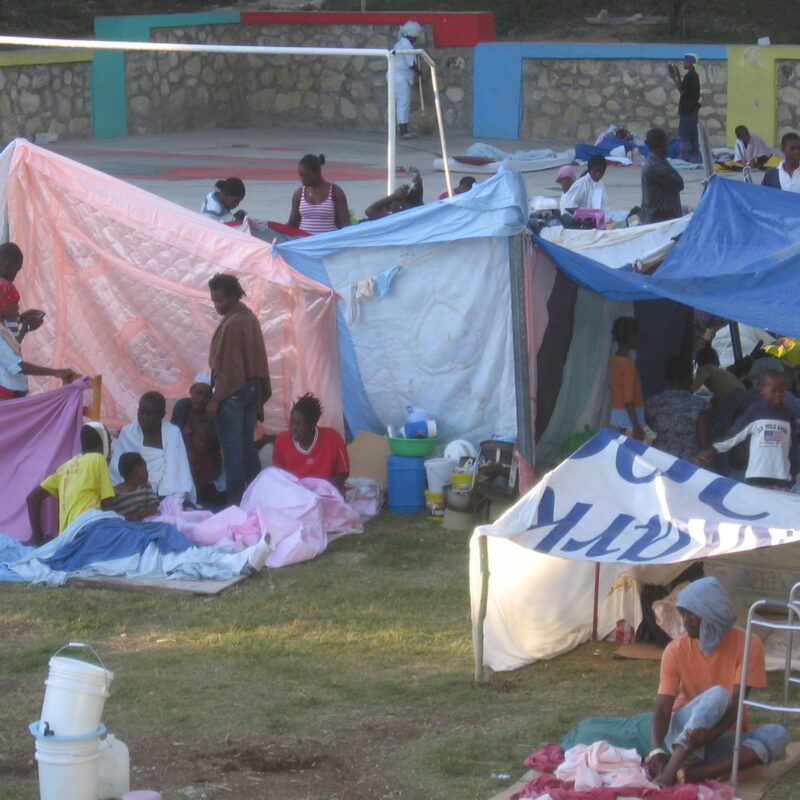Following the earthquake in January 2010, Sr. Mary Finnick, along with Vivian and Patrick Tortora and Ricardo Balmir, were either employed by or volunteering at Matthew 25 House, a guest facility run by The Parish Twinning Program of the Americas. The house, located next to the Antoine Izmery Soccer Field, became a safe haven for those fleeing the disaster. By the end of the night, the field had transformed into Camp Izmery, providing shelter for over 2,000 displaced individuals, many of whom were injured.
Before the earthquake, both Matthew 25 House and the soccer field were central parts of the community. The soccer program, basketball court, and playground were gathering places for locals. After the earthquake, these same spaces became vital for the injured and displaced.
Thankfully, the Matthew 25 building was well-constructed, with strong concrete walls that withstood the quake. It was safe to enter, allowing the volunteers to access food, bedding, and medical supplies. While Matthew 25 was not a clinic, the supplies on hand, which included basic first aid items and some medical equipment stored by a visiting group, were crucial in those early days.
At the time, there were fewer than a dozen guests in the house, several of whom were medical students. Sr. Mary, a nurse, quickly mobilized these students, along with a local nurse and physician, to provide care. The house had a full cistern and an undamaged solar/electric generator, allowing them to run extension cords to the field. Two exam lights were used to set up first aid stations, and medical assistance began in earnest.
The soccer team, comprised of young men from the neighborhood, stepped up as security, ensuring the field was not overcrowded. Families set up sleeping areas on one side of the field while the injured were treated on the other. Many of these young men also served as interpreters, proving invaluable throughout the crisis and in the year that followed.
The international help that arrived was heartfelt, compassionate, and generous, providing aid without question. Nations known internationally for not being allies freely cooperated in this natural disaster. Countries provided aid under their flags along with The Red Cross, The Red Crescent, and the prominent relief organizations that fall under the United Nations blue and white aid umbrella, such as The World Food Program (WFP), and the World Health Organization (WHO)
The first foreign flag we saw was Belgian. The Belgian Be Fast Team arrived about five days after the disaster setting up camp near a damaged hospital within walking distance of Camp Izmery.
We approached them for help, explaining the limitations of Matthew 25’s medical supplies. The Belgians had the items we lacked, but they had no potable water. A Belgian physician told us that if we could transport the Camp’s injured to them its medical team could place the patients under mild sedation during wound care treatment, offering them both a pain free experience and much-needed rest.
Our neighbors, who manufactured sand water filtration systems gladly gave filters to the Belgians solving their potable water problem. This marked the beginning of cooperative lending giving and trading relationships that as more help arrived crisscrossed among nations and aid organizations throughout Haiti.
As the weeks went on and the most urgent and dire needs were met we noticed that as Americans our access to international aid agencies and organizations remained the same. Haitian access did not. No door was ever closed to us Americans. A knock opened every door, making food, tents, tarps, pharmaceutical, construction, and agricultural surplus supplies available to us. The doors appeared to have been closed to Haitian citizens.
Because agencies and organizations must work within the parameters of their mission, i.e. a food relief agency is restricted from using donations received for that purpose to pay for wheelchairs or school supplies. Unopened doors were not from a lack of generosity but proper stewardship of restricted donations.
When a catastrophic disaster strikes a population, be it natural or human-caused, many continuing human needs fall through the cracks of even the most careful paradigm. The nine of us who formed KareDrew did so to try to ease the fall by strictly adhering to our mission of only assisting Haitian initiatives.
